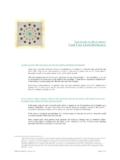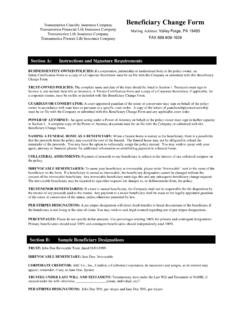Transcription of COLLAPSING LIFE INSURANCE TRUSTS WHEN THEY ARE …
1 1 COLLAPSING life INSURANCE TRUSTS when THEY ARE NO LONGER NEEDEDThe client who is enamored initially with saving estatetaxes on the proceeds of a life INSURANCE policy by placing it inan irrevocable trust may find himself or herself disenchantedseveral years later. This occurs for a variety of reasons. Whenit occurs, clients look for a way out of this irrevocablearrangement. So does irrevocable mean unchangeable forever? The answer is no. Reasons for Termination of an Irrevocable life INSURANCE TrustAn insured has to part with all control over a policy on herlife if estate taxes on the proceeds are to be saved on theinsured s death. For that reason, someone other than the insuredfrequently applies for and purchases the policy on the insured slife.
2 when an irrevocable life INSURANCE trust is established,it is the trustee of that trust (someone other than the insured)who generally applies for and purchases the policy. If theinsured buys the policy and later transfers it to the trustee, ifthe insured dies within three years of the transfer, then theproceeds will be subject to estate taxes in the insured s this need to part with control for taxpurposes, it is usually the insured who instigates thetermination of an irrevocable life INSURANCE trust . Here aresome common reasons why an insured may wish to terminate hisirrevocable life INSURANCE trust :<The policy has become too expensive to maintainand after it lapses (assuming a life settlement isnot an alternative), few assets will be left inthe trust .
3 <The insured is no longer happy with the terms ofthe trust . Perhaps the insured was happilymarried when the trust was established, but he andhis wife are now divorced and his former wife isthe only beneficiary of the trust until her death. Maybe that child the insured thought was taking awhile to grow up has proven herself to befinancially irresponsible beyond a shadow of adoubt and distributing assets outright to her atcertain ages (in keeping with the trust terms) isno longer a good <The federal estate tax exemption has increasedsignificantly since the INSURANCE trust wasestablished and/or the insured s net worth hasdecreased so that estate taxes are no longer anissue. As a result, the client wishes to regaincontrol of the INSURANCE Between Insured s Wishes and Trustee s DutiesThere may be a tension between the insured s desire toterminate a trust and the trustee s duties under California law.
4 For example, a well-drafted INSURANCE trust will prevent thepolicy from ever returning to the insured in order to keep theproceeds exempt from estate taxes in the insured s estate. Ifthe insured wants to regain control of the policy because estatetaxes are no longer an issue, the trustee has no power to returnthe policy to the insured and has an affirmative duty to be loyalto the trust beneficiaries. If the trustee gives the policy tothe insured, she breaches the trust and exposes herself to alawsuit by the trust s beneficiaries! In this situation, analternative would be for the trustee to sell the policy back tothe insured for its market value. In most situations, the trustee will not be asked to returnthe assets of the INSURANCE trust to the insured.
5 Instead, hewill be asked to transfer the assets to a new irrevocable trustor to distribute the assets outright to the beneficiaries of theexisting irrevocable trust when it terminates. If the trustassets will be distributed outright to the beneficiaries, thetrustee must be careful to calculate properly the present valueof the interests of the income beneficiaries and theremaindermen, unless the trust directs how its assets are to bedistributed on termination. A transfer of assets to anotherirrevocable trust can take place in one of two ways: (a) thepolicy can be sold to the trustees of the new INSURANCE trust forits market value, or (b) if the trustee has the power to do so,the policy can be added to another trust having the samebeneficiaries with similar terms.
6 The latter approach is helpfulif the basic terms of the trust are still satisfactory but achange of trustees is desirable and there is no mechanism forchanging trustees in the old the Terms of the INSURANCE trust to Terminate ItA well-drafted INSURANCE trust has flexibility built into itand may contain a provision enabling the trustee or a special 3(independent) trustee to terminate it. In the absence of such aprovision, it can be very expensive and time-consuming forclients to go to court to effect a termination. Furthermore,there is no guarantee that a judge will agree that the insurancetrust should be following types of clauses can be used to terminate aninsurance trust :<A power in the trustee to terminate a trust ofrelatively small value or that has become overlyburdensome or expensive to administer, with adirection as to how the assets will be distributedon termination.
7 <If the value of the trust assets is small ( ,because the trust contains only enough money topay INSURANCE premiums as they fall due) and thebeneficiaries still have Crummey withdrawalrights, it may be possible to pass all assets ofthe trust out to the beneficiaries through theexercise of their withdrawal rights. If so, thetrustee and beneficiaries must follow carefullythe procedures set forth in the trust for theproper exercise of these withdrawal rights.<Someone may have the power to appoint ordistribute trust assets in favor of or to acertain class of persons during the insured slifetime. For example, an independent trustee mayhave the power to distribute or appoint trustassets in favor of the insured s descendants forany reason.
8 <Along similar lines, if the trust calls foroutright distributions to beneficiaries at certainages, the trustee may have the power to acceleratethose distributions. Not all trust powers are created equally. It will beincumbent upon the trustee and his lawyer to determine whetherthe scope of a power is broad enough to permit the trustee toaccomplish the insured s objectives without committing a breachof Approval, If NeededIf the trust instrument does not provide mechanisms toenable the trustee and/or beneficiaries to terminate the trustthemselves, it may be necessary to petition the court toterminate the trust . For California TRUSTS , to do so, there mustbe some authority under the Probate Code for seeking termination.
9 By Grantor and All California Probate Code Section 15404, if thegrantor and all of the beneficiaries of a trust consent, they maycompel the termination of the trust . This section allows thegrantor and all of the beneficiaries to terminate a trust withoutcourt approval. Under Probate Code section 15410(b), ontermination, the trust assets will be distributed in the manneragreed upon by the parties. However, practically speaking, courtapproval may be necessary or desirable, for the trustee sprotection or because there are minor or unascertainedbeneficiaries and a Guardian ad Litem is needed to consent ontheir behalves. If all of the beneficiaries do not consent,Probate Code Section 15404(b) still permits the Court toterminate the trust , provided that the interests of thebeneficiaries who do not consent are not substantially by All California Probate Code Section 15403, all of thebeneficiaries of an irrevocable trust may compel its termination.
10 However, unlike Probate Code Section 15404, a termination by aTrust s beneficiaries, without the grantor, requires a courtpetition; and the Court will determine how its assets will bedistributed upon termination, pursuant to Probate Code section15410(c). If the continuation of the trust is necessary to carryout a material purpose of the trust , it cannot be terminatedunless, in the Court s discretion, the need for the terminationoutweighs the interest of carrying out the material purpose ofthe trust . Under Section 15403(b), the Court does not have thediscretion to terminate a trust with a spendthrift provision. What constitutes a material purpose of a trust is a question offact and may be shown by the terms of the trust instrument orextrinsic evidence.






